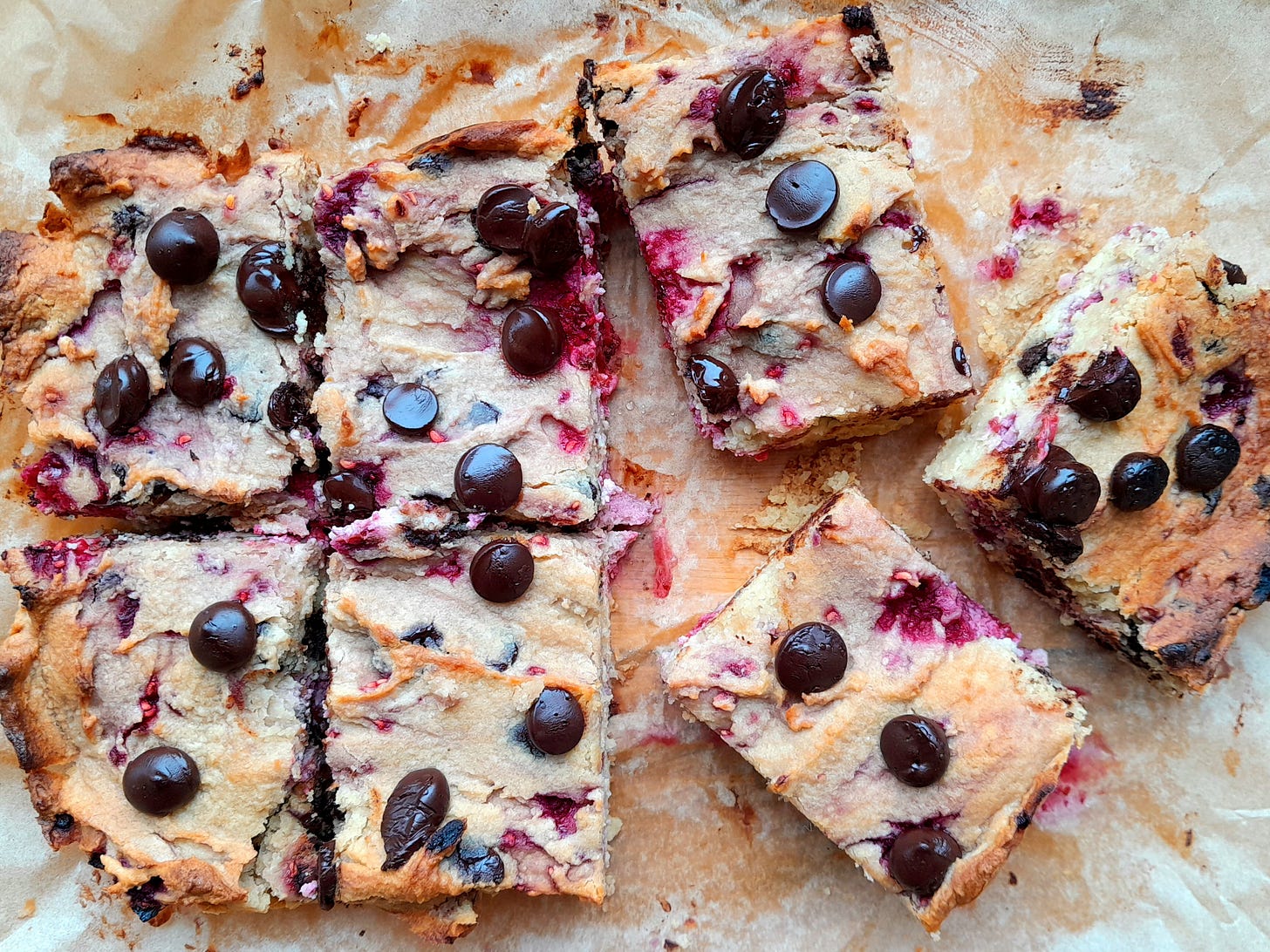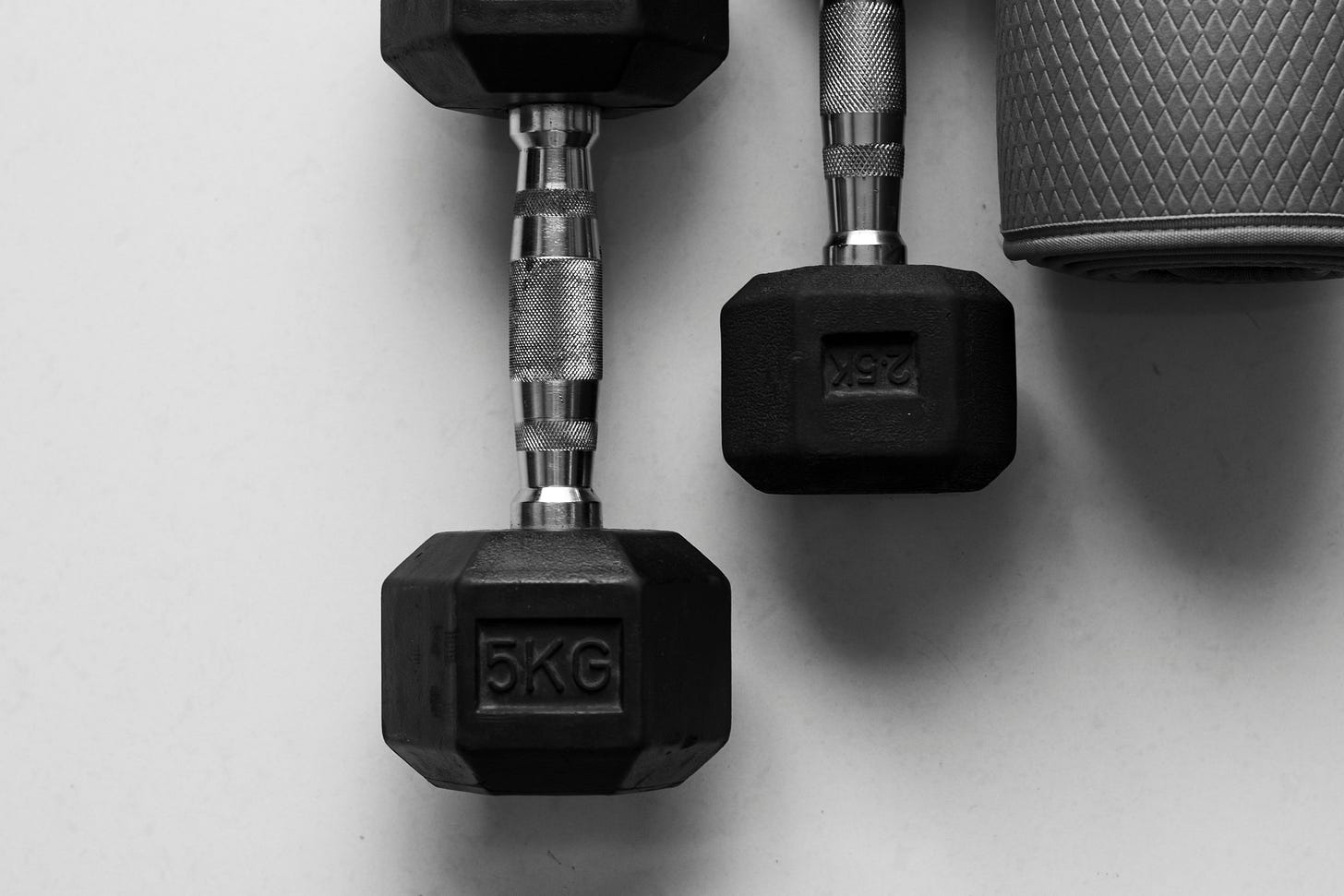Stress & perimenopause.
It's World Menopause Month! How to manage stress in midlife, tips for supporting immunity, plus Chickpea & Tahini Blondies.
Happy World Menopause Month! 🎉 Since 2009, the International Menopause Society and the World Health Organisation have designated October to raising awareness and tackling the stigma around menopause. World Menopause Day is on 18th October and the theme this year is Menopause Hormone Therapy (or HRT in the UK).
Over the last week there’s been a lot of discussion in the media about HRT off the back of the BBC investigation Panorama: The Menopause Industry Uncovered. If you’ve watched the programme, you may have come away thinking that HRT is something to be feared. But, if used correctly and under the right guidance, it can be extremely beneficial for many people. Having said that, HRT is not a magic bullet and may not be suitable for everyone. There’s also no single supplement that’s going to relieve you of your symptoms in an instant. Instead, we need to understand the importance of being able to filter out the marketing nonsense and social media misinformation to make informed choices with science-based information and guidelines. We also need to remember that there’s no universal experience of perimenopause. A holistic approach that takes into account what we eat, how we move, how we manage stress, our sleep habits and how we talk to ourselves, whether we use HRT or not, will all have a positive impact on our wellbeing in midlife.
I’m sure everyone will admit to regularly feeling stressed and this can be particularly prevalent in perimenopause. In this edition of Midlife Bites, I take a look at what actually happens to your body every time your stress response is triggered, how this may be affecting your perimenopause experience and what you can do to better cope during stressful periods.
Now that autumn is well and truly upon us, this month’s habits are focused on what we can do to support our immune health over cold and flu season. Spoiler: it doesn’t involve stocking up on a miracle cure to ‘boost’ your immune system. For me, this time of year is also cake-baking season, so on that theme the recipe this month is for Chickpea & Tahini Blondies. Chickpea blondies have been a bit of a TikTok viral trend recently — this recipe is packed with plant-based protein from the chickpeas, ground almonds and tahini, as well as fibre and beneficial antioxidants from the raspberries and dark chocolate. The best bit is that they’re SO easy to make and taste delicious.
For paid subscribers, I delve into one of the most well-researched supplements out there — creatine. Once the supplement of choice in the fitness world, creatine is now being heralded for its ability to enhance cognitive function and support the changes we experience in perimenopause. But how does the research stack up? Should we all be adding a creatine supplement into our routines? I also share my top podcast recommendations, which touch on the importance of changing the narrative around menopause to emphasise positive experiences, something I’m passionate about!
As always, I’d love to hear from you if you’re interested in working together, or if you have any questions, comments or feedback — either hit reply or book a free 1-to-1 chat.
How does stress affect perimenopause?
Whether we like it or not, stress has become a normal feature of modern life. But what actually happens to your body every time you find yourself on edge? When faced with stress, our body triggers the ‘fight or flight’ response of the sympathetic nervous system — a reaction that sadly hasn’t evolved to fit with the stresses of modern life since the days of sabre-tooth tigers. This response activates the release of the stress hormone adrenaline, which prepares the body for danger: energy is sent to muscles, heart rate increases and the body becomes alert. At the same time, functions such as digestion and the immune system are reduced and compromised (ever notice that slightly sick feeling before doing something outside of your comfort zone?).
The hormone cortisol is also released when you’re feeling stressed; over time this may impact your immunity, metabolism, sleep, mood and energy levels. The relationship between cortisol and oestrogen is complicated — oestrogen helps regulate the production of cortisol, meaning that it lowers the impact of cortisol during times of stress; however, high cortisol may also lower oestrogen levels. In perimenopause, when oestrogen is fluctuating, you may find that sometimes you’re less able to cope with stressful situations. This relationship will also have an impact post-menopause when oestrogen levels are low. Chronically high cortisol may inhibit progesterone production, reduce testosterone levels and may also indirectly increase histamine levels. Excess histamine may lead to issues such as: hay fever-type symptoms; itchy skin; headaches; brain fog; low mood; fatigue; hot flushes'; skin flushing; bloating; diarrhoea or constipation.
There can also be strong emotional associations between certain foods and the feeling of comfort, where reaching for a highly processed sugary treat (or a glass of wine) whenever we feel stressed or upset can easily become habit. This may impact blood sugar balance, leading to fatigue and weight gain, as well as affecting energy levels, mood and sleep.
The overall experience of perimenopause itself and the impact of symptoms may also make you feel worse by creating additional stress. There’s research to suggest that women who expect menopause to be a negative experience or are highly stressed may be more likely to experience a more negative menopause.
Just as the body has a response to stress, there’s also an opposing mode for restoring balance, which allows the body to restore and repair. Research has shown that techniques such as mindfulness may be effective in engaging this parasympathetic nervous system. But what other habits can we adopt to better cope with stress, particularly during perimenopause? A nutrient-dense diet is important during stressful periods, because the nutrients needed to support these processes may become depleted over time — plus, we may also be more susceptible to vitamin and mineral deficiencies during this time of our lives. Other changes such as reducing sugar, caffeine and alcohol, regular moderate exercise (including strength training), prioritising good quality sleep and making time for specific stress-relief activities (think music, reading, spending time with friends), will all help to reduce the impact of stress. Paying close attention to your triggers will help you to take care of yourself both physically and emotionally and help keep your stress levels under control.
To support immune health
As we enter cold and flu season, we can look forward to being bombarded with a barrage of ‘immune-boosting’ miracle cures. But unfortunately there’s no single food or diet that will ‘boost’ your immune system. In fact, the idea of ‘boosting’ your immune system to ward off the lurgy is misleading and scientifically inaccurate.
The immune system is a complex network of cells, tissues and organs that work together to help the body fight infection — it’s constantly working to respond to and protect us from pathogens such as bacteria, viruses and toxins. When you feel under the weather with a cough, runny nose or fever, these symptoms are not caused by germs, but instead are signs that your immune system is fighting back against an infection. If you were to ‘boost’ your immune system, you would be enhancing these unpleasant symptoms. So instead, we should be looking for ways to ‘strengthen’ or ‘support’ our immune system to optimise our ability to fight infection. Here are three tips to support your health this winter:
Vitamin D: Known as the ‘sunshine vitamin’, vitamin D is produced in the body when your skin is exposed to the sun. With many important functions, vitamin D is crucial for supporting your immune system health — amongst its many benefits, it has anti-inflammatory properties and regulates the production of immune cells. The NHS recommends that every adult supplements with 10μg (400IU) per day between October and the end of March and that we all consider supplementation throughout the year. I recommend regularly testing your vitamin D levels and supplementing depending on your results.
Sleep: Sleep is an important time for the body to restore and repair, so it plays a crucial part in the strength of our immune system. It’s suggested that sleep strengthens immune ‘memory’, meaning that it reinforces the immune system’s ability to recognise and react to dangerous antigens. A study found that people who slept for 5 hours or less a night were more likely to develop a cold, so lack of sleep may impact the body’s ability to fight infections. Make sleep a priority and try to get at least 7 hours sleep per night.
Stay hydrated: We all know that it’s important for our health to drink sufficient water (and we could all probably do with drinking more!), but making sure you’re properly hydrated is essential for healthy immunity. Hydration supports various aspects of immune function, including: the elimination of toxins; helping with the transport of immune cells; maintaining the health of the mucosal barriers (or the protective linings inside the body) which help prevent germs from entering the body. So as well as the recommended 8 to 10 glasses of fluid per day, try to include hydrating foods such as soups, stews, smoothies and fruit as part of a balanced diet.
If you’re interested in working with me on a 1-to-1 basis, why not book a complimentary chat to find out more about how I can support you through perimenopause. And if you’re on Instagram, come and say hi.
Chickpea & Tahini Blondies
Makes: about 8 | Time: 35 minutes
There’s nothing quite like a good homemade cake — I love a Victoria sponge and I have the best chocolate cake recipe that makes an appearance for most birthdays, but often I’d like something sweet with more nutritious ingredients. Unlike the sickly sweet traditional blondies, this recipe uses chickpeas as the base, combined with ground almonds to create a fudgy texture, making it naturally gluten-free and packed with protein and fibre. It’s sweetened with maple syrup and the tahini gives it a deliciously rich and creamy texture — along with being a good source of protein, healthy fats, iron, calcium and magnesium (great for bone health!). Raspberries are a lower sugar fruit and are a great source of vitamin C and beneficial antioxidants. Team that with dark chocolate chips and you have a super-satisfying afternoon snack or dessert. If chickpeas aren’t your thing, swap for cannellini beans; try nut butter instead of tahini; or make it nut free with oat flour instead of ground almonds.
INGREDIENTS
1 x 400g tin chickpeas, drained & rinsed
100ml tahini (or any nut butter)
80ml maple syrup
1 teaspoon baking powder
50g ground almonds (or oat flour)
3 tablespoons milk (or milk alternative)
60g 70% cocoa dark chocolate chips
100g frozen raspberries
pinch of sea salt
METHOD
Preheat the oven to 180C (fan). Line a shallow square tin (roughly 23 x 16cm) with baking parchment.
Place the chickpeas on a clean, dry tea towel and gently dry them.
Pour the chickpeas into a food processor and add the tahini, maple syrup, baking powder, ground almonds and a pinch of salt.
Blend until smooth; then add the milk and blend again — the mixture should be the consistency of cake batter.
Set aside a small handful of chocolate chips, then fold the remainder through the mixture. Add the raspberries and stir to combine.
Spoon the blondie mixture into the prepared tin and level with a spatula. Top with the reserved chocolate chips.
Bake for 30 minutes until golden — the centre should be set and the edges starting to brown slightly.
Cool in the tin for 10 minutes and then place on a wire rack by lifting out the baking parchment. Cool completely before slicing.
Is creatine the supplement we all need?
Creatine is all over social media at the moment, with every other wellness influencer promoting some form of creatine supplement. What was once the staple of gym junkies, creatine seems to have now hit the masses. But what even is it and should we all be adding it to our diets pronto?
Keep reading with a 7-day free trial
Subscribe to Midlife Bites to keep reading this post and get 7 days of free access to the full post archives.












